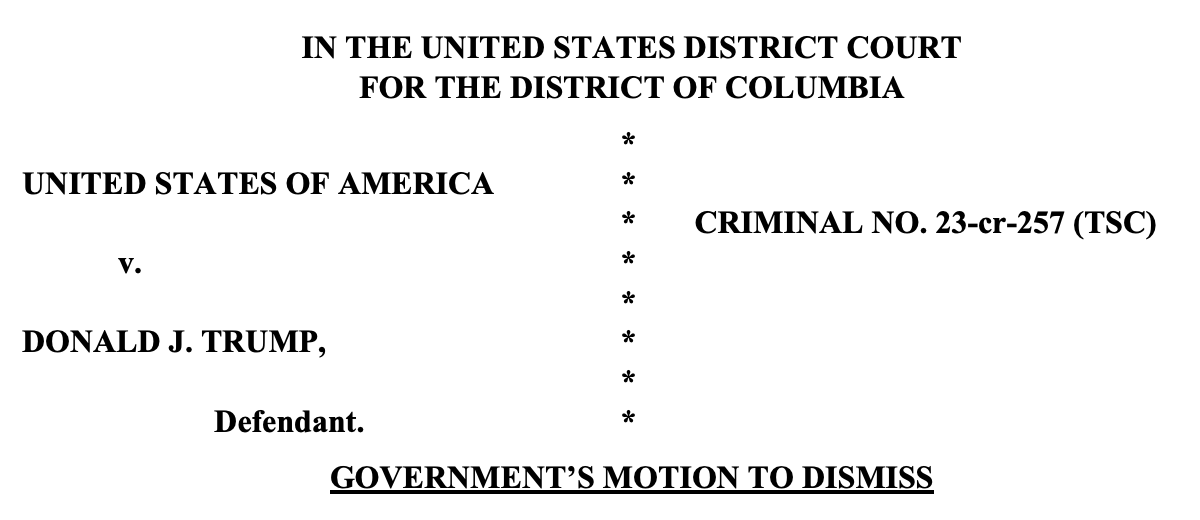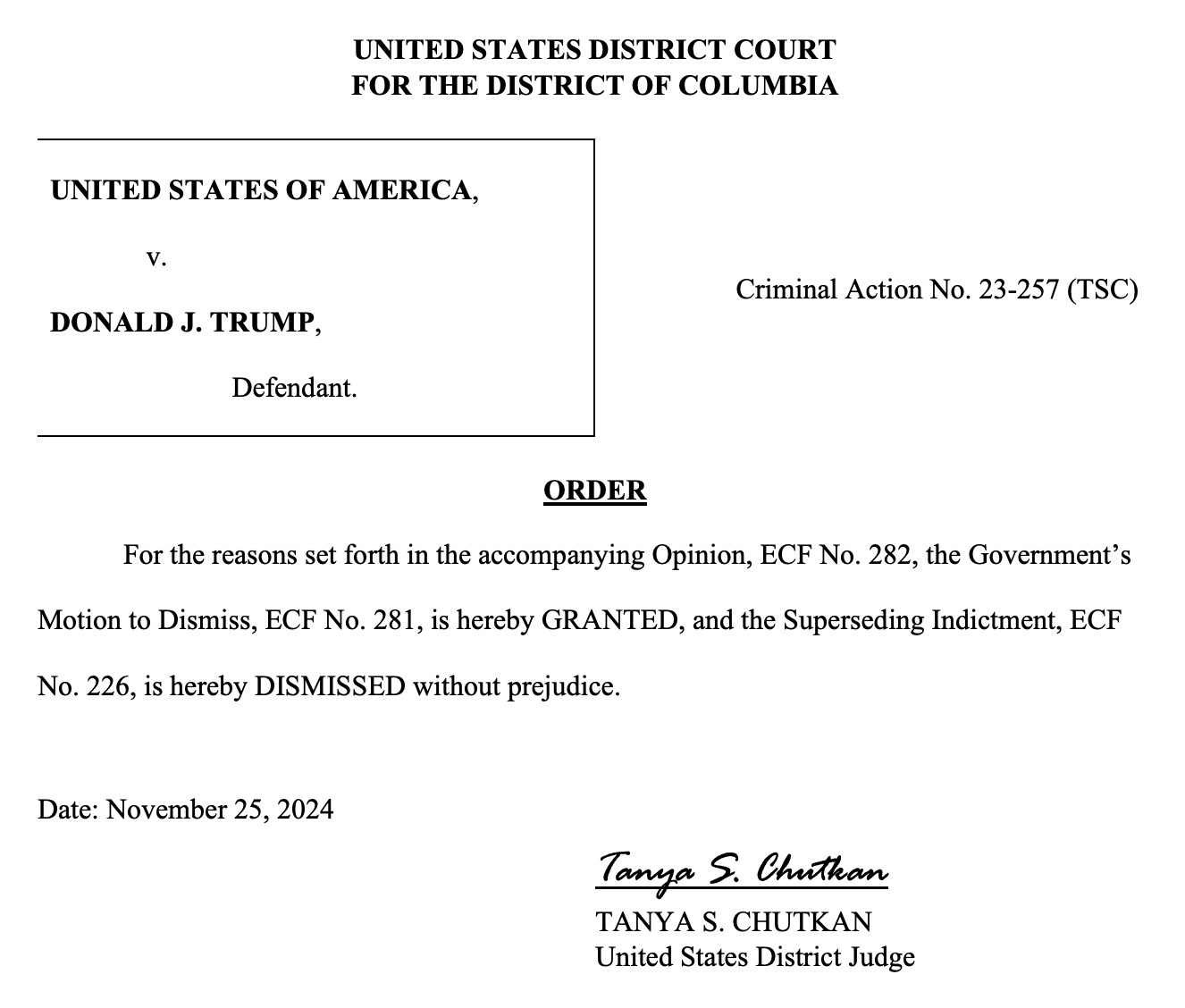Jack Smith folds, dismissing both federal cases against Donald Trump
It was, perhaps, inevitable, but it is notable that even in the face of the past four years, Smith still took an institutionalist's path. Also, for paid subscribers: Closing my tabs.
Less than three weeks after the election, and nearly two months until Donald Trump returns to the presidency, Special Counsel Jack Smith gave Trump what he wanted — an end to the federal prosecutions he has been facing for more than a year.
In brief filings on Monday, Smith told both courts where Trump’s cases currently sit that his election and pending inauguration mean, the Justice Department has decided, that Trump cannot face prosecution and the cases must be dismissed.
Now, some version of this was going to happen — now, in the coming weeks, or on shortly after Jan. 20 — but how it happened is worthy of note.
In his filing in the Jan. 6 case, Smith asserted that, in light of the election, he consulted with the Office of Legal Counsel — the Justice Department section responsible for advising on legal questions involving the executive branch — that has twice previously issued opinions relating to the question of whether a president can be indicted. Unlike those situations, involving Richard Nixon and Bill Clinton, the indictment already happened here when Trump was not president.
Here’s where OLC, DOJ, and Smith came out:
OLC concluded that its 2000 Opinion’s “categorical” prohibition on the federal indictment of a sitting President—even if the case were held in abeyance—applies to this situation, where a federal indictment was returned before the defendant takes office. … Accordingly, the Department’s position is that the Constitution requires that this case be dismissed before the defendant is inaugurated.
With that, Smith filed his motion to dismiss the Jan. 6 case before Judge Tanya Chutkan in federal district court in D.C. and another motion at the U.S. Court of Appeals for the Eleventh Circuit to dismiss the appeal of Judge Aileen Cannon’s decision dismissing the documents case. (Smith did note in that filing, however, that — for now, at least — the prosecutions against the other two defendants, who are not set to become president in January, will proceed.)
By the end of the day Monday, Chutkan had dismissed the D.C. case, without prejudice, as Smith sought, and with a brief opinion. This would mean that, technically, the case can be refiled in the future, but I wouldn’t hold my breath.
This was a quick-moving dismissal that fits with a sort of institutional-supporting presentation of the needs of the Justice Department and the presidency, but it raises the question of why this is how Smith would proceed if, as he wrote, “This outcome is not based on the merits or strength of the case against the defendant.”
Even if OLC is right, this is a problem that exists when Trump becomes president again. In other words, it’s not a problem now. If Smith wanted to take the most aggressive posture possible, he could have waited until Jan. 20 to file the dismissal requests.
I’m not sure it matters, in the long run, when Smith dismissed the case, but I think it shows a continued reliance on the very institutions around Smith that failed to play their roles in holding Trump accountable over the past four years. (And, for what it’s worth, people hanging their hat today on some report from Smith, good luck to you all. I didn’t write about it, but I am seeing some comments related to that, so, I just wanted to make clear that I do not expect that to be anything substantial. I could be wrong!)
The House took too long on Trump’s second impeachment; the Senate failed to convict Trump in the second impeachment; the Justice Department moved slowly and things only picked up speed after Smith took over (which was after Trump announced he was running for president again); and the Supreme Court had a trio of failures — not taking the immunity case early as Smith sought, rejecting Colorado’s Fourteenth Amendment ballot decision, and holding that presidents maintain significant criminal immunity for life.
Nonetheless, on Monday, Smith took the institutionalist’s path.
Not with a bang but a whimper.
Blue skies ahead
John Paul Brammer wrote about leaving X, the space formerly known at Twitter.
“I think it’s fair to say that now, after over a year of this morbid song and dance, yes, Twitter is certifiably, undeniably X; something different, something unrecognizable,” he noted.
More than 15 years after I joined Twitter, it’s sad but true. Accordingly, and as I’ve said on all of the other places, I’ve not yet closed my X account, but I basically only use it for basic news posting. Over the weekend, my Bluesky follower count surpassed my X follower account. And even that understates things a lot since so many X accounts are inactive zombie accounts at this point.
As such, Bluesky is where you should be following me if you want what used to be my live-tweeting and more interaction-based social media account. Law Dork is also active there, although I’m still figuring out exactly how to handle both accounts. I tend to put the more in-the-weeds legal news at Law Dork, so definitely be following there if you want that!
Closing my tabs
This Monday, here are the tabs I’m closing:






